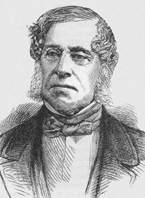
George Payne was one of the
great Corinthians
of the nineteenth
century. As well as his patronage
of the Turf he was Master of the
Pytchley Hunt for
three seasons.
An incorrigible gambler he is
reputed
to have divested at least two fortunes,
and possibly
three,
on the Turf and
at the card-table, although
his losses
never caused
him to lose his composure.

|
Few people enter
into this world endowed with the privileges bestowed on George Payne:
affluence, a magnetism that drew men, as well as women, to his company
and remarkable talents that would have guaranteed him a successful
career in whatever profession he chose. But George Payne sought neither
fame nor political ambition: for him there were far better things in
life, and instead he devoted his life to the Turf, the Chase and the
card-table.
Born in the
year before Nelson annihilated the French and Spanish fleets at
Trafalgar, he was orphaned in his infancy under what must have been
particularly distressing circumstances, his father having been shot
dead in a duel. As the eldest son he inherited
Sulby Hall – built
by his grandfather, Rene Payne, a partner in the banking firm of
Smith, Payne and Lepper – and £300,000 in cash and securities.
Financially secure he embarked on a reckless career of gambling on
the Turf and at the card-table. The money did not last long; but he
certainly enjoyed the journey. A year before his coming of age he
lost £33,000 by Jerry’s victory in the St Leger, coolly remarking
that it was a pleasure to lose it!
Although his
betting was often reckless he was, on occasion, desperately unlucky
with some well planned coups. He failed by the shortest of short
heads to win £60,000 when Lord Lyon beat Savernake for the Derby in
1866; and in Cremorne’s year, a further £40,000, when Pell Mell
failed by a head to get to the winner. And imagine his horror when
his own filly, Welfare, on whom he had only a hundred pounds, almost
took the shine out of the great Crucifix for the Oaks, on whom he
stood to win several thousands. He swore that seeking out the first
mirror he came across he fully expected to find that his hair had
turned grey.
He was also
unlucky with his own horses. From the age of twenty until his death
he was never without horses in training. At Sulby Hall he bred
Pauline, dam of Gladiator (ch c 1833
Partisan),
one of the great sires of the nineteenth century. His one classic
success was in the 1847 One Thousand Guineas with the beautifully
bred Clementina (Venison –
Cobweb), a filly he had reluctantly purchased on a recommendation.
He became the owner of the great stayer Musket (b c 1867
Toxophilite), whom he inherited
from Lord Glasgow, although in recognition of the bequest, Musket
always ran in the latter’s colours.
With Colonel
Peel, with whom he had shared the inheritance of Lord Glasgow’s horses,
he bred the 1878 Derby winner Sefton (b c 1875 Speculum), on whom he won £20,000, little
realising it was to be the last time he was to witness the Blue
Riband.
But for all
that he was dearly loved for his cheerful nature, his coruscating
persona, and delightful wit. And when he died, a few months after
Sefton’s Derby, his loss was deeply felt by thousands, from the
aristocracy to the humblest Northamptonshire tradesman. As Thormanby
tells us the reason is not hard to find: "George Payne was a true
English gentleman, large hearted, high-spirited, the pink of
chivalry and the soul of honour – a man of a most lovable nature".
A J Byles
|

